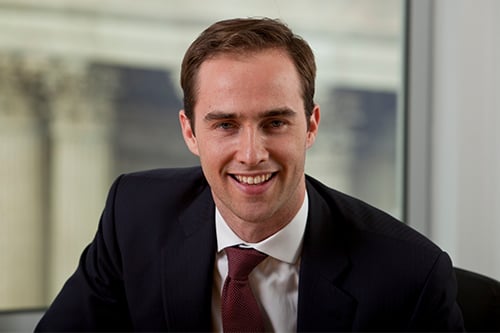

What was your initial response to the Supreme Court’s ruling on the FCA’s business interruption test case? For Ben Pilbrow (pictured above), a partner at Shepherd and Wedderburn who represents the QIC Action Group (QAG), the reading of the judgement was something of an emotional rollercoaster.
“My wife and I have taken to doing lessons with our kids in the morning and so I failed to log into the Supreme Court handing down its judgement,” he said. “I knew it was up on the website so got on to that at about 10. And the first 30 or so pages of the judgement did not read very well for the insureds.
“So, for the first 15-20 minutes, I had a sinking feeling in my gut but then I started reading the clauses about proximate cause and so on, and it got a bit better… I think it’s an impressive judgement. And it was difficult to see how you could argue against the High Court judgement so I just don’t see how you could argue it’s the wrong result.”
Read more: How the QIC Action Group was formed
The immediate reaction of Cliff Nicholls (pictured below), MD of UK trampoline park Jump Xtreme and chairman of the litigation committee of QAG, was one of elation. Simply put, he said, the judgement means survival. Without the ruling, it’s not certain that his business could pull through the crisis, though it has done its best to batten down the hatches over the last 13 months of closure.
“The bill for rent alone is in the region of £155,000 and staff have benefited from furlough but we’ve had to pay their NI and pension costs for a substantial time during that furlough period. And, of course, there are other bills besides rent. So, what this means is that we should come out of this in reasonable shape, financially. Depending on how well we now settle the arguments about quantum, we will either end up at a marginal loss or a marginal gain, though not better than we would if we had been trading.”
In addition to arguments on quantum, the question of business rates, and considerations surrounding the furlough scheme, Pilbrow noted that the trends clause is an added complication. This is especially pertinent to Nicholls’ business, he said, because Jump Xtreme showed a very strong positive trend before the crisis.
“We were up almost 20% year on year, up until we closed in March,” Nicholls said. “So, we were on a real growth curve when we were forced to close and it’s difficult to quantify the exact loss but we were probably on track to make in the region of £250,000 for the financial year, ended August last year. And, I don’t know the exact sum yet, because it will depend on the [payment of our claim] but we’re probably looking at breaking even at best.”

Friday brought with it a warning from the FCA that insurers need to step up and pay valid claims or face enforcement and the question of what comes next regarding the payment of claims is one on the minds of many businesses. Addressing market discussion regarding the use of automation in the payment of claims, Pilbrow highlighted his belief that insurance companies will be taking a bespoke approach as to whether or not to employ automation.
Where there are claims with sub-limits that may have been exceeded multiple times over and which have time limits, he said, paying out essentially becomes something of a tick-box exercise and it makes sense to automate the process as much as possible, while taking all necessary precautions to limit fraud.
“On the other side, however,” he said, “I think there’s a difference with say the QIC Europe / Eaton Gate combined commercial policy that Cliff has, and with various others because you’re looking at larger figures. And some of [QAG’s] policyholders don’t have a three-month limit or a two-year limit as well, at which point it actually is in the insurer’s interest to spend some money and argue about what [each element] means. Because a difference of five or 10% on how you apply the trends clause will actually have a significant difference on their financial payout.”
The longer-term implications of this case are substantial and Pilbrow highlighted that these are not limited just to the UK. These policies were being underwritten worldwide, he said, and he’s had a number of inquiries from other locations, including the Republic of Ireland. Nicholls noted that the Google alert he set for the issue has picked up news from Australia, the US and all around the world. A good chunk of global insurance players have been impacted by this, he noted, which will inevitably have ramifications for capacity and, unfortunately, also for rates.
Though questions remain as to exactly what the final pay-out will look like and when it will become available, Pilbrow and Nicholls both paid tribute to the effort that has gone into the court cases deciding this outcome.
“It’s thanks to Ben and to everyone else, and to the FCA, who have moved incredibly quickly,” Nicholls said. “I remember when Ben and I first discussed this process when it was announced we were saying that probably mid this year would be a good outcome to get this thing resolved if it was going through that sort of court process. So, to have done it as quickly as they’ve done, I think credit is due to the FCA and to the lawyers on both sides. I think everybody’s clearly worked flat out to get this thing through as quickly as it possibly could be.”
